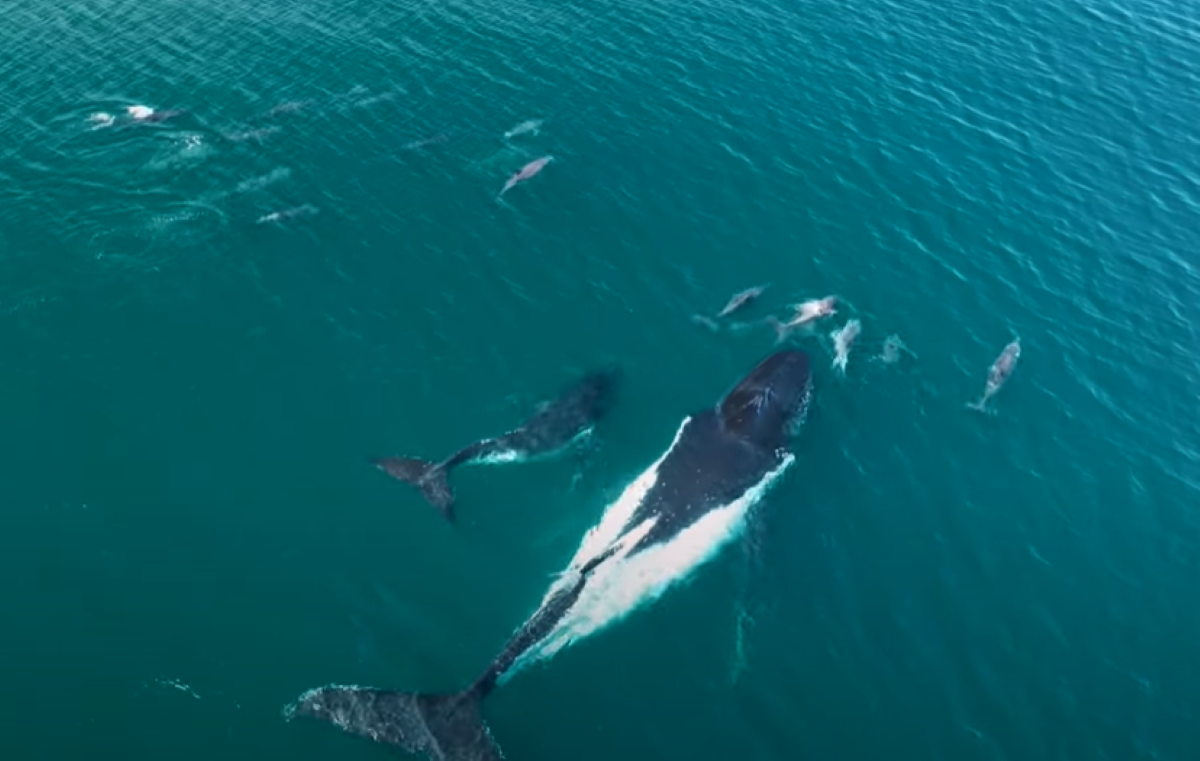A pod of dolphins led a whale and her calf back to their migration route after they became lost and distressed, a heartwarming video shows. The albino mother humpback whale was found by the Dolphin Discovery Centre, near Bunbury's Back Beach in Western Australia, after a few beachgoers noticed her in "distress."
The whale—which had a dark front and a snowy-white back body—was at first mistaken for an orca by witnesses. But when the Dolphin Discovery Centre took a closer look, it realized it was an albino humpback whale, the Bunbury-based nonprofit said in a Facebook post.
This wasn't the only thing it discovered, however. The whale had a calf swimming alongside her, and they had come very close to the coast in 45-foot-deep water near the city of Bunbury.
During this time of year, humpback whales migrate along the coast of Western Australia toward Antarctica, where they feed. Dolphins and whales will often share habitats but mainly stay with their own species.
Although both whales were fit and healthy, they were in quite a predicament this close to shore, away from their migration route. That is, until the pod of dolphins came to the rescue and began to lead them back to shore.

A video of the moment was shared on social media and shows the heartwarming moment when the whales were led back to their route. In the clip, the whale and her calf can be seen swimming through the water as the pod of dolphins swims ahead of them, dipping in and out of the water.
The sea creatures move in unison with one another, and soon the whales are back on their way.
The Dolphin Discovery Centre expressed gratitude on Facebook to those who had called in concerned about the whales.
Dolphins and whales are extremely intelligent creatures and have been observed displaying socially complex behaviors. Both rely on others for protection and support. Dolphins travel everywhere in pods and have been observed playing together in social situations. A recent study found that they even gather during dinner parties, just like humans.
Scientists are learning more about how these cetaceans interact and sometimes work together in certain situations. While the dolphins appear to be helping the humpback whales in this case, sometimes cetaceans can view each other as a threat if there is competition for prey in the area.
This incident was notable not only because of the social interaction between the dolphins and the whales. It is relatively rare to see albinism in whale species. The condition means there is a lack of pigment in the whale's skin. Their skin appears a different color to others, making them instantly recognizable, or they look closer in appearance to other species.
Albino whales are a sight to behold in the wild and often draw the attention of locals and tourists.
Do you have an animal or nature story to share with Newsweek? Do you have a question about dolphins? Let us know via nature@newsweek.com.
Uncommon Knowledge
Newsweek is committed to challenging conventional wisdom and finding connections in the search for common ground.
Newsweek is committed to challenging conventional wisdom and finding connections in the search for common ground.
About the writer
Robyn White is a Newsweek Nature Reporter based in London, UK. Her focus is reporting on wildlife, science and the ... Read more
To read how Newsweek uses AI as a newsroom tool, Click here.






